Mistakes to Avoid After a Car Accident
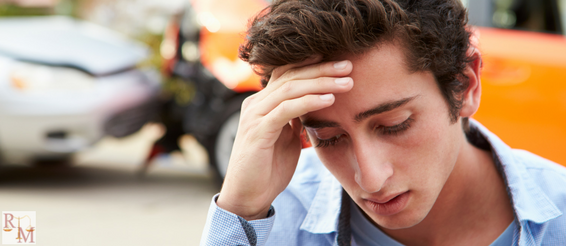
So you’ve just been in a car accident. Thoughts are rushing through your mind and you’re a bit confused on what to do next. But what happens in the next couple of minutes could affect you for months, years, or the rest of your life. We’ve talked before about what to do after an accident, but to help you steer clear of the worst, here’s a look at what not to do.
Don’t assume you’re not injured.
Never say you’re “okay” or assume you’re not injured. In many cases, an injury might not manifest until much later. It’s fine if you don’t need an ambulance, but outwardly state it as “I don’t need an ambulance at this time.” If you do end up talking to first responders, let them know exactly how you feel, even if the pain or discomfort is minor. Remember, you might be in shock, which has a way of masking pain. Always make sure to see a doctor after an accident, as soon as you possibly can. Lastly, if you have apparent injuries, get to the E.R. right away.
Don’t delay taking action.
If you need legal help on your side, waiting can hurt you. Try taking care of things as soon as possible, including getting medical care, starting the investigation of the accident, seeing a personal injury lawyer in Sacramento and getting your suit filed.
Try not to assume the insurance company is on your side.
Put simply, they’re not. Their goal is to pay you as little money as possible. Avoid assuming fault and don’t go into details about your injuries. If they ask to record the statement, decline. In fact, it’s best not to talk to the insurance company at all until you have a lawyer on your side.
Call the police.
Always get the police involved so that they can create an accident report. This establishes the documentation you need if you do need to take legal action. Without it, your chances at compensation are significantly reduced.
Never say it’s your fault.
No matter who you’re talking to – the police, the other driver, witnesses, an insurance rep, anyone – never say it’s your fault. Things can get confusing, especially after an accident, but don’t let the heat of the moment pressure you into saying something you don’t mean or that isn’t true.
Be thorough; Gather evidence.
Get your facts and proof together right away. That means gathering names and contact information of witnesses and snapping accident shots with your smartphone.
Don’t take a quick settlement from your insurance.
Once you accept a settlement, your case can not be re-opened. So if your insurance company offers you a quick solution, don’t take it. It may not be the best deal. Remember, you shouldn’t even be dealing with the insurance company – that’s your lawyer’s job.
Don’t sign papers the insurance company gives you.
They’re your insurance company, not your friends. Signing papers they give you after an accident can limit your chances at the compensation you deserve. Avoid signing releases, medical authorizations, and other paperwork they push toward you. Always talk to your lawyer first.
Avoid posting accident details on social media.
Car accidents in Sacramento are common, which means people’s Facebook and Twitter feeds are full of people giving personal information about what happened to them during their incidents. Your insurance company can use this information against you. Avoid putting any information about your accident — even the most basic things — on social media.
Don’t turn down legal help; get an attorney!
Your insurance company, other drivers, and even the police are not necessarily on your side when it comes to accidents. You need someone who will work on your behalf, for your best interest, after an accident. Only an attorney will be able to do that. Contact one right away if you’re in an accident.
If you have any questions about your car accident or want to learn more about how a personal injury attorney can help you, call our offices at (916) 863-2900 for a free consultation.
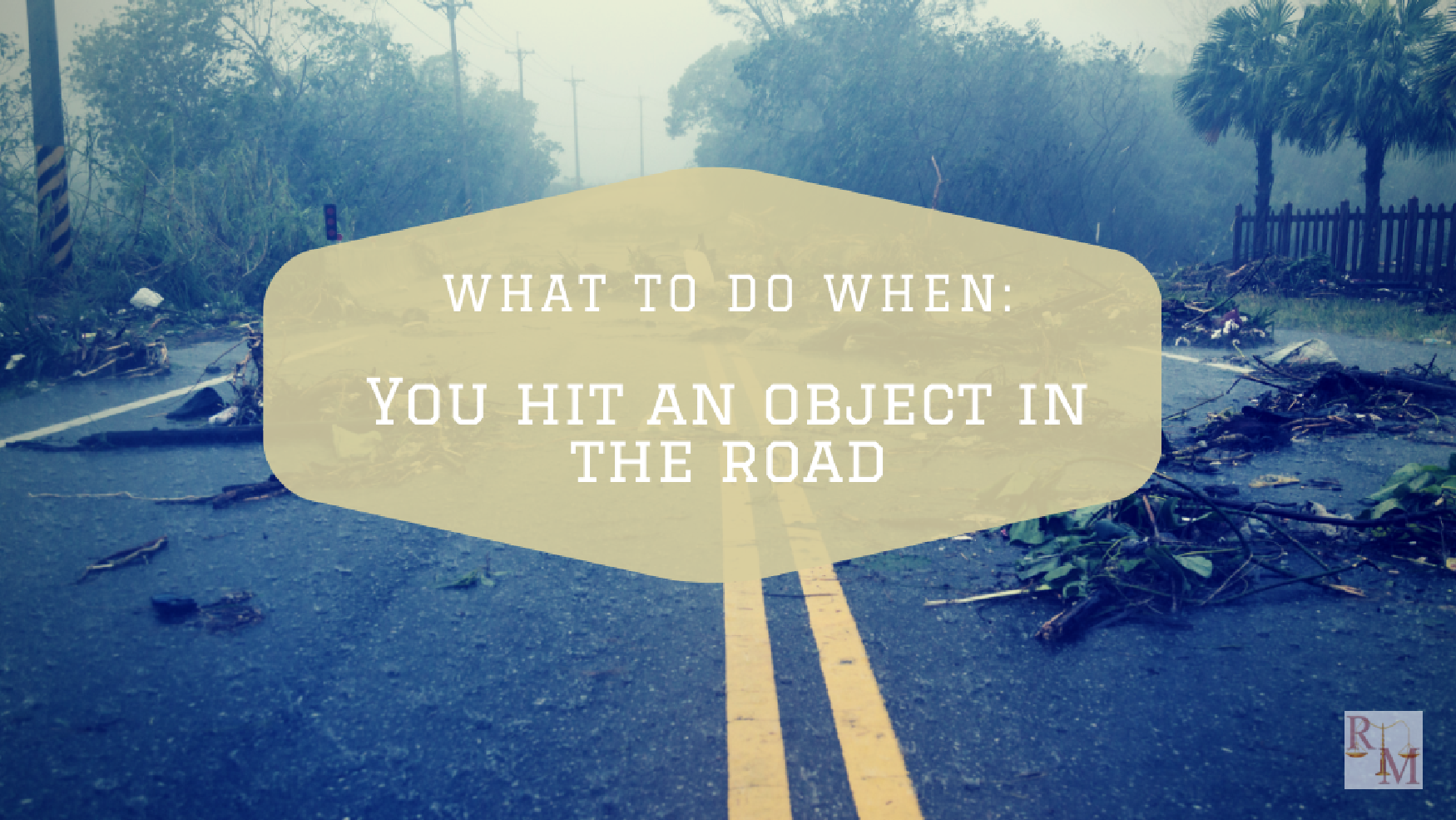
No one wants to be in a collision, but accidents can occur when you least expect them to. The same is true for single car incidents when a driver hits an object in the road. However, if the object is unavoidable and there is damage to your car, what happens next and who is “at fault”?
Stationary vs Flying Objects
The nature of an insurance claim is determined by the type of object hit; naturally, there is good news and bad news. The good news is that if an object came flying at your car, such as a piece of broken truck tire or falling rock, there was no time to react, and the object was in midair when you hit it, then it is a comprehensive claim, as opposed to an at-fault, collision claim which you file for hitting a stationary object. In either scenario however, if you want or need to file a claim to repair the vehicle, you will have a deductible and, in the latter scenario, your insurance may go up.
Avoiding An Object
It’s said that if you are driving and an animal darts in front of you, or is simply stopped in the road, that you should plan on hitting it, rather than swerve to avoid it. The reason behind this thinking is that, the average driver is not as aware of their surroundings as they really should be and swerving to avoid the animal might cause more damage or injury. This is not to say that you should plan on running straight into an object on the road before you, but to say that, as a driver, you have the responsibility to be aware of not only your immediate surroundings but of what lays ahead. If you can safely avoid the object without hitting another car, or risking a more dangerous situation, than you should avoid it. As soon as you realize the situation, begin to decelerate and quickly take stock of what is around you. Obviously, avoiding any type of collision is the goal, but a collision with a bush is better than a collision with a concrete barrier.
Drive Smart
We’ve all seen it- a twenty year old pickup truck, loaded to the gills with rickety pieces of wood and debris precariously strapped in, and swaying to the motion of every movement. The best advice? Stay far away from those vehicles. As with life in general; while we can’t avoid every surprise life will throw at us, we can make the decision to avoid the obviously dangerous situations. If you get behind a vehicle that makes you nervous, move over or pull over until they are away from you. It’s simply not worth the white-knuckle driving you would have to do being in their vicinity.
The lawyers at the Law Offices of Robert L. Meissner are experienced in getting people who have been injured the compensation they deserve. If you are looking for a Sacramento auto accident attorney, please call (916) 863-2900, or fill out our online form for a free consultation.
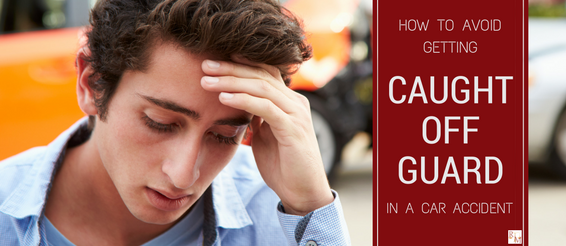
No one gets into their car planning to have an accident, but more often than not, these things are outside of our control. While we all hope for the best, it is important to prepare for the worst.
According to the National Highway Traffic Safety Administration, over 2.3 million people were killed or injured in car accidents in 2014. Young drivers are at an even higher risk – motor vehicle crashes are the leading cause of death for 15-20 year-olds. For you and your family’s safety, it’s important to have a plan in place in case of a car accident that you communicate to all the drivers in your family. Here are a few things your plan should include:
Get out of the road
After an accident, you should strive to get your car to the side of the road as quickly as possible. The presence of a crashed car in the middle of the road can lead to additional injuries. If, for whatever reason, the car cannot be moved, everyone should stay inside the car – don’t go out into a busy street! – with their seat-belts fastened and hazard lights on.
Put together an emergency kit
An emergency kit is crucial in case an accident results in injuries. The kit should include a cell phone, a first aid kit, emergency contact numbers, and a list of any medications or allergies that car occupants have. You’ll also want to include a flashlight, batteries, and road flares in case an accident occurs at night. A fire extinguisher is also a good thing to have on hand.
If you regularly go on off-road trips, out to trails, or other places where help may take longer getting to you; you’ll want to consider adding a few more items as well, such as blankets, granola and protein bars, and water. Some water bottles are packaged to have a long shelf-life.
Insurance and information
While you’re putting together an emergency kit you should consider what you’ll need to record the accident. Include paper, a pad, and a pen (to take down information from the other driver or from witnesses), a disposable camera to take pictures of the damage, and your own insurance information and contact numbers.
After the accident
Once you have safely handled the immediate aftermath of the accident, there are two things you’ll want to do. The first is getting a full checkup at the emergency room. Just because you have no visible wounds or bruises, that doesn’t mean you have not sustained any internal injuries. Car accidents can result in serious brain, head, neck, and spinal cord injuries, some of which can be fatal. It is therefore crucial that you go to a hospital and inform medical professionals that you have been in a car accident.
Finally, you’ll want to be sure to report your accident and speak to a Sacramento auto accident attorney as soon as possible. If there are no injuries, police may not arrive to the scene. However, you should still file a report with your local police department, as this record can be important for insurance purposes.
It’s no surprise that teen drivers are particularly vulnerable to distractions on the road, leading to many potentially deadly car accidents. A study by AAA reveals that in the summer months alone, over 1,000 people die in crashes involving teen drivers. In fact, vehicle accidents are the number one cause of death for teenagers in the United States. Here are the top driving distractions that lead to these types of auto accidents:
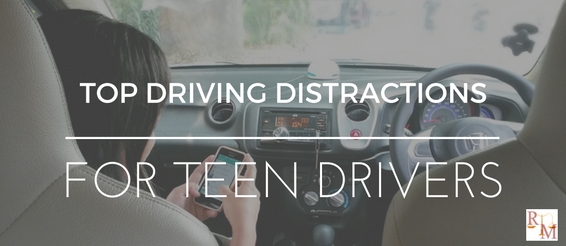
1. Talking to other passengers:
According to the AAA report, talking and attending to other passengers in the car is the leading cause of teen driving accidents. In fact, the risk of an accident increases as the number of unsupervised teenagers in the car increases.
2. Talking, texting and using a mobile phone:
Not surprisingly, talking and texting while driving is another major factor of teen driving accidents. Using a cell phone reduces the focus available for driving by around 37 percent and raises the risk of accidents four times.
3. Looking at or reaching for something inside the vehicle:
As with using a mobile phone, looking around for something inside the car reduces the amount of attention available for what’s going on in front of you. Teenagers are particularly susceptible to these distractions, which cause about 16 percent of teen driving accidents.
Because they lack experience with driving, teenagers are often less aware of the risks they face while on the road. They may overestimate their own skill, or underestimate the dangers of distracted driving. It is therefore imperative for parents to talk to their teens about vehicle safety. Discuss what distracted driving can look like and what are the inherent risks. Talk about how it’s easy to dismiss dangerous situations when you’re not giving them your full attention and how these kinds of distractions can cost lives.
Most importantly, make sure to set a good example yourself. Keep your cell phone out of the way when you’re driving and make a point of showing your teen how you deal with distractions in the car. By demonstrating safe and conscious driving, you can provide your teenager with a role model to emulate when they are behind the wheel.
Meissner Law has been protecting the interests and rights of clients for over twenty years. Give us a call at (916) 863-2900 for a free consultation with the top personal injury attorneys in Sacramento.
When you’ve been in a car accident, the chaos that follows can be overwhelming. You’re exchanging insurance information, checking the car for damages, waiting for the police to arrive and more. In all that confusion, it’s crucial that you don’t lose sight of your own health. In fact, your first concern should be ensuring that you haven’t sustained any head injuries.
According to the Atlanta Nation Center for Injury Prevention and Control, motor vehicle accidents are responsible for 20 percent of all head injuries and account for the greatest number of hospitalizations for such injuries. Even if you haven’t actually hit your head, whiplash can make your brain slam into your skull, causing bruising and bleeding.
Nerve fibers can also be damaged. The effects of these injuries may not be immediately apparent to you in the aftermath of a car accident, but they can be very dangerous and could lead to a loss of consciousness or even death.
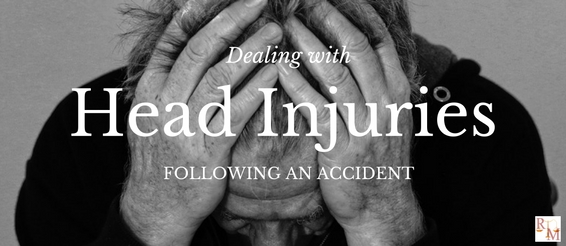
What To Do After The Accident
Even if you don’t have any visible injuries, you should go to an emergency room after a car accident. Medical personnel can run tests and make sure that you haven’t sustained any internal injuries, including brain injuries. As a patient, you should ask specifically about brain injuries and explain that you’ve been in a car accident. If you suspect that you lost consciousness, however briefly – that is a significant sign of a brain injury.
Symptoms To Look Out For
In the hours, days and even weeks following your accident, make a point to watch out for the following symptoms of a head injury:
- Headache
- Drowsiness
- Vomiting
- Nausea
- Memory loss
- Numbness
- Slurred speech
- Confusion
- Dizziness
- Dilated pupils
- Cognitive issues
- Changes in behavior and mood
- Disorientation
- Difficulty walking or balancing
- Sensitivity to lights and sounds
Speak to your family members or those you live with and ask them to be aware of these symptoms too – some may be difficult for you to notice on your own, especially memory loss. If you notice any of these symptoms, return to the emergency room as soon as possible. The earlier you catch a brain injury, the less likely you’ll be to experience dangerous complications.
Meissner Law has been protecting the interests and rights of clients for over twenty years. Give us a call at (916) 743-1537 for a free consultation with the top personal injury attorneys in Sacramento.
Car accident is a term commonly used to describe any sort of fender bender, collision or wreck involving one or more vehicles. But is this really the best term to describe the nature of the incident?
Not at all. In fact, the majority of what are deemed “accidents” are preventable. Since controllable factors such as distracted driving, drunk driving or speeding are typically the cause of these “accidents,” why do the media, courts and insurance companies use and maintain the term accident?
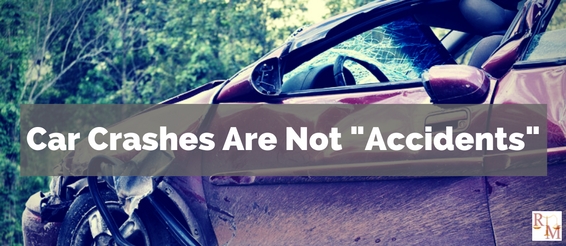
Accidents vs. Crashes
The problem with using the term accident to describe all car collisions is that there is no culprit. This effect is very useful for defendants in car crash cases and for their insurance companies. A defendant guilty of causing a car crash wants the jury and their insurance company to believe it was an uncontrollable accident.
If you are the victim of a car crash and seek legal guidance for the damages you have suffered, what can you do about this displacement of blame?
- Never refer to the crash as an “accident.” Refusing to use this common terminology will demonstrate your conviction that the crash was, in fact, the result of another person’s negligence.
- Take pictures at the scene of the accident and provide a detailed incident report to the proper authorities. Request and keep copies of any recordings or reports performed by legal officers, as these documents can be a lifeline in the courtroom.
- Consult an experienced personal injury attorney. You are entitled to legal redress for your damages, so hire a professional to get you the maximum settlement possible.
Changing the Narrative
What can you do to hold careless and dangerous drivers accountable? Stop using the term accident and stop exonerating the people responsible for these preventable events. Call out vehicle collisions for what they really are: crashes perpetrated by another person’s negligence.
Have you suffered personal injury or the wrongful death of a family member? Meissner Law has been protecting the interests and rights of clients for over twenty years. We know how to get our clients the legal compensation that they deserve. Give us a call at (916) 743-1537 for a free initial consultation with the top personal injury attorneys in Sacramento.
The question of fault in driverless car crashes is a hot topic these days. In 2015, Volvo was the first company to make the pledge of full liability for accidents caused in self-driving technology mode. But what does that mean for companies that decline to bear the brunt of liability? While these liability laws may adapt to the new technology, the core laws will likely remain. Since accountability first goes to the driver, if you are in the driver’s seat of a driverless car and a collision occurs, the liability will initially be yours.
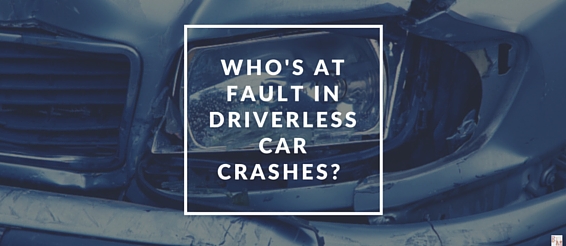
The Human Factor
The good news is, since human error is the main factor in most collisions, we can expect the rate of collision occurrences to diminish dramatically with the use of driverless cars. These vehicles use rational prediction to anticipate the actions of other vehicles, but can still get into accidents with other vehicles. For example, one of Google’s driverless cars caused a crash with a bus. Although there was a human in the driver’s seat, they allowed their vehicle to predict what actions the bus would take and did not seize control of the unmanned automobile. A question for all driverless car manufacturers is, “Would the same collision have occurred if two driverless vehicles had been in the same situation?”
Driverless Cars and Humanity
While the thought of being able to read or nap on long, solitary road-trips is a possibility in the future, we have a ways to go until the human element is completely unneeded behind the wheel. Statistically, these vehicles make our roads safer, but there is one final concern that must be addressed. Is there an ethical dilemma to relying on driverless vehicles? Utilizing technology for basic and defensive driving does not replace the human spirit and quick thinking that sometimes saves lives. Will driverless cars see all options, including those which may not seem “logical” to a machine, but are essential to humanity? They say that the programming is only as good as the programmer, so let’s hope that driverless car programmers have both extensive skills and a full heart.
Whether you’ve been in an accident with another motorist or a driverless vehicle, it is important to speak with a knowledgeable personal injury attorney in Sacramento as soon as possible. For more information, call (916) 743-1537.
When you’re involved in a collision, a lot can begin to happen in a short amount of time. To properly handle the stressful ordeal, you will need to keep copious notes and create a file of paperwork for everything related to the accident. If a personal injury lawsuit is filed, you may be required to provide a deposition. As a way to obtain information under oath for each side of the case, depositions may be crucial in proving your innocence in the accident.
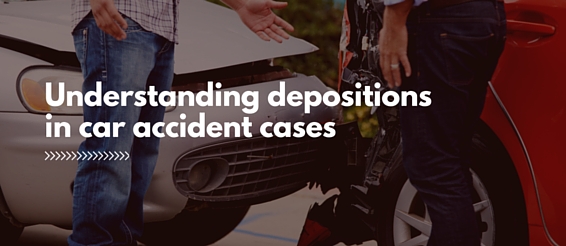
What Happens in a Deposition?
A deposition occurs when all parties involved in the lawsuit come together, along with the attorneys for each side and someone to administer the oath. They will ask about your background, general health before the accident, any medical treatment since the accident and information about the accident. Your attorney will be there to assist with any questions which may be viewed as improper.
What If I Don’t Remember Everything That Happened?
During questioning, they may ask something that you don’t remember or simply don’t know. When providing a deposition, honesty is the best policy. If you do not recall something, tell the questioner that. Making up an answer or answering how you think you should is never a good idea.
Should Answers Be “Yes” or “No”?
One of the most important parts of the deposition process is to understand how you will answer questions. Keep in mind that “yes” and “no” answers lock you into a response, while statements such as “I believe so” or “Not that I recall” leave more leeway. Don’t be afraid to pause between the question and answer so that when you respond, your reply is short, concise and does not give away more information than required. Also, don’t be afraid to ask for clarification if you don’t understand the question.
A Few Final Thoughts
Remain aware of your mind and body during the deposition. If you need a break for the restroom or a snack, make everyone aware before answering the next question. Your personal appearance should resemble that of a job interview, so try to present yourself as clean and ambitious. Ask to see records or reports to which they refer during questioning to confirm the accuracy of information. If needed, ask your attorney to depose other individuals involved in the accident, such as medical personnel or witnesses.
Depositions can appear daunting, but with the right preparation and a knowledgeable personal injury attorney in Sacramento on your side, you’ll be primed to answer anything that comes your way. If you need an attorney who will look out for your best interests, contact the Law Offices of Robert L. Meissner for a complimentary consultation by using our online form. Feel free to give us a call at (916) 473-1537.
Fatigued driving has caused as many as 7,000 documented deaths in the past decade. Unfortunately, many victims of accidents involving impaired drivers suffer injuries, medical complications or emotional trauma long after the accident. If you have been in an accident or suffered property damage from a driver that may have been fatigued, here are some necessary steps to make sure you get the compensation you deserve in a personal injury claim.
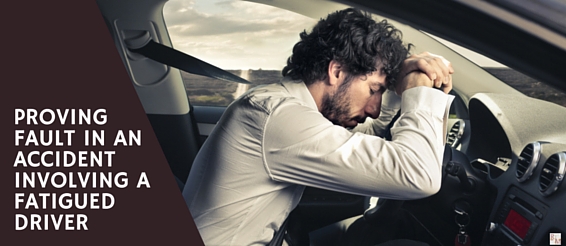
Tips for proving fault
1. Take as many photos as you can of the accident, property damage and injuries sustained. Before the scene is altered or cleaned up, you will want to have photos as a visual record of the damages. For more information on what to do after an accident, check out this blog for helpful tips.
2. If you do not immediately notice any injuries after an accident and someone asks whether you are injured, say you are not sure. Car accident injuries can surface days or even weeks after the accident, appearing as whiplash, brain trauma or emotional damages. Try to avoid admitting that you were not injured in an automobile crash, as this statement can hurt your claim.
3. When giving a police report and talking to your lawyer, disclose any observations of the other driver’s behavior prior to the accident. If you saw that they were fluctuating in speed, tailgating, failing to use turn signals, weaving, drifting or veering between lanes, let your attorney know as these behaviors can prove driver negligence.
4. If significantly injured, seek medical attention immediately. Make sure to document your medical visits, pain levels, medication and physical ability in a journal. Don’t forget to keep your attorney updated regarding your medical condition after the accident.
5. As we said in our blog on successful personal injury cases, let your attorney and the evidence do the talking. Try to refrain from talking about your case in a way that can be used against you in court. This includes posting on social media in a way that contradicts your claim.
6. Most importantly, call a qualified personal injury attorney. Fatigued driving is especially difficult to prove in court, as the plaintiff needs to establish evidence of negligence. An attorney is essential to ensuring that your case results in receiving ample compensation for your ordeal.
Being in an auto accident can be devastating and damages sustained from a fatigued driver are no different. If you have been the victim of damages or injuries due to driver negligence, contact Meissner Law to help you get the compensation you deserve. For more information on the top personal injury attorney in Sacramento, give us a call today at (916) 473-1537.
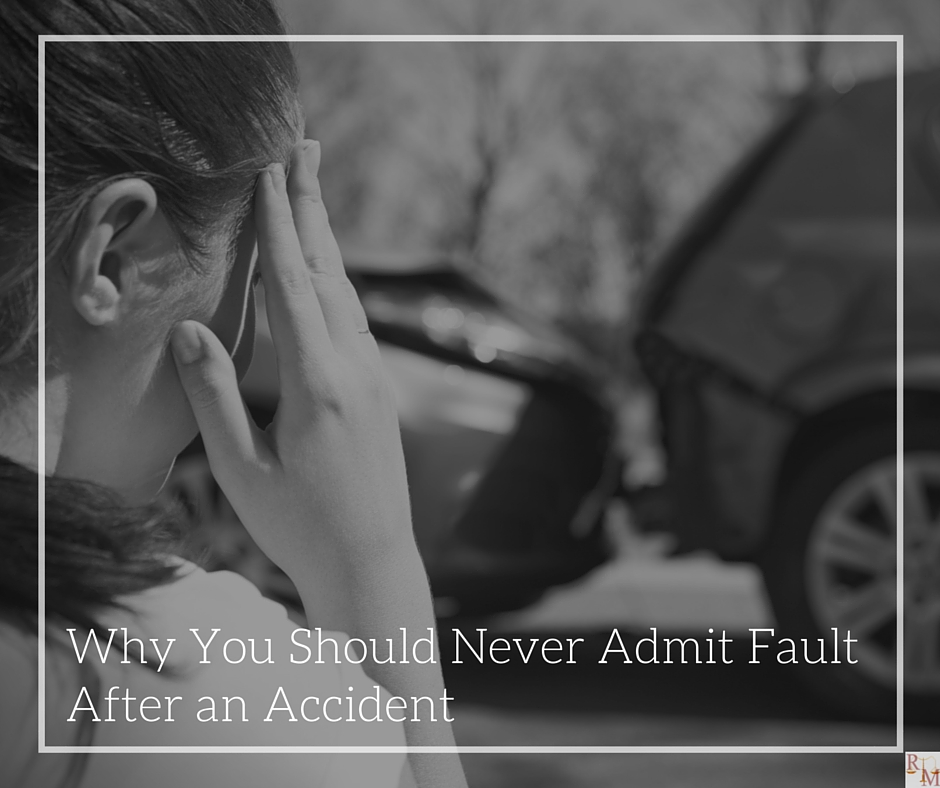
Moments after an auto accident, you begin to notice injuries to passengers and damage to your vehicle. After checking to see if everyone is alright, the next big question often asked after a car crash is, “whose fault was the accident?” Some drivers involved in auto accidents are eager to assign fault and will blame the other motorist, while others might apologize for their actions. Regardless of who was at fault, this question can significantly impact the outcome of a personal injury case. While assigning fault outside an official police or witness report seems natural after the trauma of an auto accident, it can come back to haunt you in personal injury cases.
The dangers of admitting fault
Prior to admitting fault in an automobile accident, there are a number of important factors to consider. Admitting fault can result in you paying more money if you are the defendant or receiving less compensation if you are the plaintiff. In many states, personal injury lawsuits can seek compensation based on a percentage of fault. For example, one driver can be found 10 percent responsible while the other motorist can be found 90 percent responsible for the accident. This percentage can be distorted if you admit fault at the scene of an auto accident or in conversation with the other driver.
Since auto accidents can be extremely stressful and emotional situations, you might admit fault without even knowing it. After cleaning up the scene and going home, you might want to talk about an accident with trusted friends and loved ones. However, it is important to watch what you say on social media, as posts such as status updates and photos can be used in court as evidence of fault. For more tips on using social media before or during a personal injury lawsuit, check out this blog.
Speak very carefully
Following a personal injury accident, it is vital that you make an effort to not say anything that can be viewed as incriminating evidence. Anything along the lines of, “I’m sorry,” or “I didn’t see you,” can be used as evidence of fault in court. While it is common decency to acknowledge regret or disapproval for an auto accident, remember that you do not have to determine whose fault it was. Let police and witness reports, photographs and other official evidence determine fault, rather than a knee-jerk reaction after an accident.
Bottom line, never admit fault when you are involved in an auto accident. Let the police and your attorney take care of the details to avoid landing yourself in hot water. If you or someone you know has been involved in an accident, it is important to speak with a qualified Sacramento personal injury attorney. For more information or to set up a consultation, call Robert L. Meissner today at (916) 473-1537.
